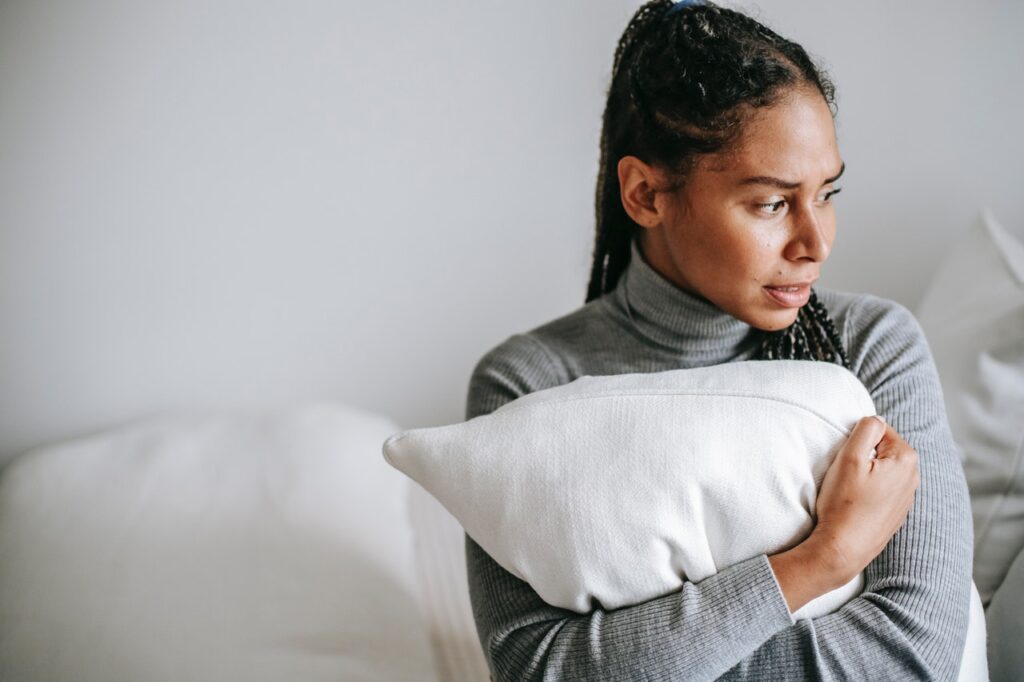11 Habits That You May Not Know Could Be Anxiety

When it comes to anxiety, how it is manifested can be expressed in many ways. Even ways that we may not necessarily associate with anxiety and that may make it hard to identify at first. Anxiety may express itself as a habit that you have had since you were a child, so you dismiss it as just something that you do. Or it could just be something you picked up along the way that you have come to accept as normal.
We at Psych2Go have compiled a list of eleven habits you may not know could be caused by anxiety.
Disclaimer: Our articles are for education and entertainment purposes only. They are not intended to self-diagnose and are not meant to be an all-encompassing book of information. If you suspect you or anyone close to you is suffering from mental illness, we strongly recommend that you go to a mental health professional. If you would like to know more about the subject discussed in this article please see the sources provided below, reach out to a mental health professional, and seek out professional studies on the subject.
1. Hair Twirling

Do you twirl your hair? To most, hair twirling is seen as an innocent act that most people do absentmindedly. It can even seem cute to outsiders. But, in some instances, hair twirling can be a sign of anxiety. According to a Healthline article called “Is twirling your hair as a habit a symptom of an underlying condition?”, hair twirling can be caused by anxiety.
The article states that “If you twirl your hair when you feel nervous or when you’re coping with intrusive, anxious thoughts, that habit might be a symptom of an anxiety disorder”.
Furthermore, in an interview with Psych2Go, Dr. Mary Ann Kuualoha Terminello, a clinical psychologist, says that hair twirling can be a way of channeling excess energy into an activity that doesn’t look like an anxiety response to outsiders. This in turn helps the person reduce their anxiety.
“Because if they are doing something that doesn’t look like an anxiety response”, Dr. Terminello told us, “The person thinks that their anxiety is masked, therefore making them less self-conscious and less anxious”.
2. Picking at your skin
Another unconscious habit that most might not think much of is picking at your skin. In some cases, though, it can be a habit caused by anxiety. According to Web MD, finding that you can relieve stress and anxiety by repetitively picking at your skin can create a habit of it. This skin picking can then become a disorder called excoriation if done excessively.
When talking about this habit, Dr. Terminello, who practices clinical psychology in Hawai’i, used some examples seen in her practice.
“Some of my patients will pick at their skin”, she told us, “It may seem like just a gross habit where they’ll pick the skin around their fingernails, almost as if it’s a fussy habit but it’s actually more of an anxious habit”. Dr. Terminello explained that while skin picking on a major level, like peeling the skin off a finger, can be a clear sign of anxiety, the more subtle signs, like picking around the nail beds, can be overlooked.
3. Daydreaming or checking out mentally
Have you ever decided to take a daydreaming break only to find out that you had spent hours looking out the window? While daydreaming is not inherently bad, it can become troublesome when it is overused and does not let you return to reality or gets in the way of you completing everyday tasks. If this happens it might be a sign of maladaptive daydreaming that may be caused by anxiety.
In a 2020 study about maladaptive daydreaming, it was found that there is a connection between maladaptive daydreaming and generalized anxiety disorder.
The study, which surveyed students at the College of Science and Health Professions at King Saud Bin Abdulaziz University for Health Sciences in Riyadh, Saudi Arabia, says that one possible explanation for the high prevalence of both maladaptive daydreaming and general anxiety disorder among the students is that they tend to predispose to one another.
“In other words,” the study says, “Maladaptive daydreaming may develop as a means to escape from the harsh reality and anxiety, into a safe fanciful world. In the opposite way, a general anxiety disorder can emerge due to the inability to adequately manage the time-consuming daydreams and the highly demanding academic obligations”.
“Therefore,” the study continued, “it can be viewed as a continuous cycle, and this can be supported by the fact that generalized anxiety disorder tends to be a comorbid disorder to maladaptive daydreaming in a number of studies.”
4. Starting Arguments

Do you tend to start arguments on purpose to get out of a conversation? According to Dr. Terminello, this might be a sign of anxiety.
“Some people don’t recognize that when a person provokes an argument it might be because they are trying to exit an anxiety-provoking conversation”, said Dr. Terminello in an interview with Psych2Go. By making the other person react angrily, they can blame the ending of the conversation on that other person and be able to escape it.
“People will look at this and think that the person starting the argument is a jerk”, Dr.Terminello said. In reality, this person is very anxious and very overwhelmed, but they didn’t want people to know it.
Dr. Terminello explained that “The person who started the argument would rather everyone else think that they are jerks than let others know that they were scared or overwhelmed over a topic because that’s more threatening than being perceived as a jerk”.
5. Being Dismissive
According to Dr. Terminello, who practices clinical psychology at the West Hawaii Community Center, being dismissive can also be a sign of anxiety. “Oftentimes a person tries to minimize a threatening situation by undervaluing what another person is saying”, said Dr. Terminello.
“Some people might take that as disrespectful, and might take it very personally”, she states, “When actually is the other person trying to distance themselves from overwhelming anxiety”.
“They don’t want to feel it, they don’t want to feel scared. It’s easier just to minimize the severity of what’s being discussed. It comes off as arrogance and dismissiveness but it’s actually a defense against anxiety”, Dr. Terminello said.
6. Fidgeting or Playing with something
Do you find yourself often playing with the first thing that you have in your hand when in a stressful moment? It is a common belief that when we see other people playing with something in their hands it means that they are being disrespectful. But, for some people, it is a way to channel the anxiety and restlessness that they are feeling.
“A lot of the energy of anxiety is active, it’s the sort of energy that makes you want to take action”, Dr. Terminello explained, “If you can’t take action at that moment, it’s good to channel it into something that doesn’t take you out of the chair and doesn’t disrupt whatever is going on”.
For example, if you are in a class and the professor is talking about a test. As a student, you can’t leave the classroom, but you might need to channel that restless energy. So, as you’re tapping your pencil or fidgeting with whatever it is you have on your hand it might appear disrespectful, but it’s not meant to be. It’s just a way to channel the excess energy.
In an article for Very Well Mind, Dr. Deborah R. Glasofer, a professor of Clinical Medical Psychology in Columbia’s Department of Psychiatry, defines this fidgeting as edginess that can also manifest as irritability, shaking, or trembling. This restlessness can be more obvious to observers than the person experiencing it.
7. Smoking

Smoking can be a habit created by anxiety. Sometimes falling into the category of fidgeting. “It can be a way to unconsciously take deep breaths which help with anxiety”, explained Dr. Terminello, “But they are using cigarettes to take these deep breaths.”
“When I think of people on smoke breaks”, said Dr. Terminello, “in many ways that is a way of managing anxiety”. If you have had a bad day and you have a chance to take a smoke break, it literally makes you breathe.
“The point is that you are slowing your breathing and taking deep breaths, that you’re exhaling in slow deliberate ways”, says Dr. Terminello, “That is very like the diaphragmatic breathing which helps people relax”.
8. Sleeping too much or too little
Sometimes, sleeping too little or too much can be a sign of anxiety. Dr. Terminello explains that “If a person gets fatigued after an overwhelming conversation or an overwhelming situation, they might look to sleeping for a way to avoid the anxiety so they don’t have to be in an uncomfortable space for too long.”
While sleeping is a way to take a pause or rest from anxiety, not getting enough sleep at night due to anxiety can mean that the anxiety is too overwhelming to let you rest.
According to the Sleep Foundation, an online source for sleep information, “connections have been found between anxiety disorders and changes in a person’s sleep cycles”.
The Sleep Foundation says that research has shown that anxiety can affect rapid eye movement sleep provoking disturbing dreams and creating sleep disruption. The nightmares caused by anxiety can reinforce negative associations and fear about going to sleep. In turn, “sleep deprivation can worsen anxiety disorders”.
“Anxiety and sleep deprivation can be self-reinforcing;” the article states, “worrying causes poor sleep, contributing to greater anxiety and further sleep difficulties”.
9. Being on social media too much
Being on social media for hours or days on end can be a sign of anxiety as well. Like some other habits on this list, social media gives us a way to escape from our stressors and anxiety triggers by engaging our minds in something else.
Dr. Terminello, a clinical psychologist, used an example of one of her patients when explaining this habit. “I have this patient that when she gets very anxious, she goes to Pinterest and looks up photos of cats”, Dr. Terminello told us, “And she does this all day long”.
According to Dr. Terminello, her patient is in the middle of moving houses but instead of helping to pack, she sits on her phone all day.
“Her boyfriend sees her on Pinterest looking at photos instead of packing and he’s yelling at her because, in his eyes, she’s not doing anything, and he doesn’t understand why”, says Dr. Terminello.
Dr. Terminello continues, “It looks like she doesn’t care about the fact that they need to move but she’s distracting herself from very paralyzing anxiety to the point of panic. She’s trying to avoid a panic attack. So, she spends hours looking at cat photos on Pinterest”.
To people looking from the outside in it looks like she doesn’t care about the move. That she’s unaffected by the pain that she’s causing her boyfriend, being disrespectful and just playing on her phone. But it’s a coping mechanism to deal with her overwhelming anxiety.
10. Talking too much or babbling

Have you ever heard someone say: “That person likes to hear themselves talk”? While sometimes that might be the case, other times talking too much may mean that the person is experiencing anxiety.
The truth is that some people that may talk a lot are overwhelmed within a social situation, or they can’t tolerate the silence. So, they start talking. According to Dr. Terminello, this person is anxious and that’s why they are talking too much. Because they are trying to relieve that anxiety through the action of talking.
It can also be the opposite when a person gets very quiet. Dr. Terminello says that quietness may be reflective of anxiety. It can come off as disinterest or not into talking to a specific person. When they are just so anxious that they get paralyzed. They don’t know what to say nor can’t think of anything to say.
11. Forgetfulness and Lack of Concentration
Memory and concentration are impacted by high levels of anxiety. If somebody keeps forgetting or keeps asking for things to be repeated because they are not concentrating or missing details of what you said and you’re thinking to yourself that they don’t care about what you say or that they are not listening to what you’re saying. This could be anxiety.
It could be that this person is so in their head about what’s bothering them that they are not present and so they seem inattentive like they don’t care about the people who are talking to them.
But according to Dr. Terminello, it is really that they are so in their head about all the things that they are worried about that they missed what was said. What’s going on in their head is more stressful than anything that’s going around them.
Do you have any of these habits? Do you recognize these habits in anyone you know? Let us know in the comments below. Remember to share this article with those who might benefit from it. Until next time!
Sources:
Alenizi, M. M., Alenazi, S. D., Almushir, S., Alosaimi, A., Alqarni, A., Anjum, I., & Omair, A. (2020, October 3). Impact of maladaptive daydreaming on grade point AVERAGE (GPA) and the association Between maladaptive daydreaming and generalized anxiety Disorder (gad). Cureus. https://www.ncbi.nlm.nih.gov/pmc/articles/PMC7532859/.
Anxiety and sleep. Sleep Foundation. (2020, December 10). https://www.sleepfoundation.org/mental-health/anxiety-and-sleep.
Ayala, D. A. (2021, August 31). Habits that seem normal but are actually caused by anxiety. Web Interview. Telegram Voice Message.
Deborah R. Glasofer, P. D. (n.d.). What does it feel like to have anxiety? Verywell Mind. https://www.verywellmind.com/physical-symptoms-of-anxiety-1393151.
Shaw, G. (n.d.). Skin picking disorder (excoriation): Symptoms, treatment, and causes. WebMD. https://www.webmd.com/mental-health/skin-picking-disorder.
Watson, K. (2020, July 14). Is hair twirling bad? Potential side effects and what it may mean. Healthline. https://www.healthline.com/health/hair-twirling#causes.



Responses